Humans being the pinnacle of evolution, our wisdom must be without peer. Nevertheless, occasional missteps—unfortunate electoral choices, methodically destroying the ecosystems on which we depend, New Coke—might trick the cynical into wishing that someone else were in charge…perhaps someone from another planet altogether. This may sound sensible…but consider our unfortunate overlords. What hope have they of governing a species incapable of governing itself?
The following five works are about aliens trying to govern those pesky humans.
“The Gentle Vultures” by Isaac Asimov (1957)
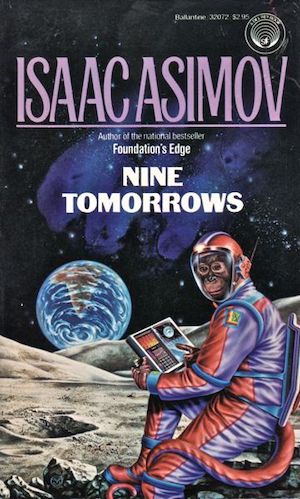
(Collected in Nine Tomorrows) The Hurrians may have only recently encountered humans, but nothing about humans is novel or surprising. Humans are violent, and immoderate—worthy candidates for Hurrian rule. Hurrian non-violence will be no impediment. Earth’s rival nations and their nuclear weapons will soon reduce Earth to a state where Hurrian intervention will appear to be the salvation it is.
That was the plan, at least. Humanity has proven oddly resistant to planetary near-suicide. Baffled as to why humans hesitate to unleash nuclear hell upon themselves when so many previous civilizations gleefully embraced atomic war, the aliens kidnap a human to discover where the infallible Hurrian plan went wrong. The answer will not please the aliens.
The Hurrians have been waiting since the human development of nuclear weapons for us to destroy ourselves. More exactly, they have been waiting fifteen years, which means the story is set in 1960. Perhaps the Hurrians have their own special vice to match the human love of violence: impatience.
Pandora’s Planet by Christopher Anvil (1972)

The Integral Union is adept at incorporating newly contacted worlds into their Union. The process is straightforward: swift military conquest followed by comprehensive reform of the planet to bring it into alignment with Union norms. In Earth’s case, however, conquest took not a week or two but almost half a year. This is an omen the Union should have heeded.
Earth is inferior to the Union in one important respect: they overlooked the breakthrough that leads to faster-than-light travel. In many other respects, human technology is superior to that of the Union. On a being-to-being level, many humans are smarter and far less dedicated to ethical behavior than the other members of the Union. Before the conquest, humans were safely bottled up on Earth. Now, they have been unleashed on the unprepared galaxy.
Usually, if I am not focusing on a particular decade, I like to space my examples out, one to a decade. Please ignore the fact that this fix-up appeared in the 1970s and focus on the fact that, as one might deduce from the “Humans Uber Alles Even If It Appears They Are Not Ubering Over Alles At All” plot, the tale first appeared in the 1950s in John W. Campbell, Jr.’s Astounding.
Unpopular Planet by Evelyn E. Smith (1975)

A novel set in the pampered, over-regulated America of tomorrow. Nicholas Piggot’s rugged good looks have won well-born Bernardine’s heart. This is a mixed blessing, as Nicholas’ rival Hubert Carmichael vows revenge. Hubert is very well connected, more than able to turn dire threat into reality. Nicholas prudently flees.
Nicholas’ talent for spreading chaos in his wake attracts the attention of Earth’s true, but very secret, rulers, the alien Mesiterit. They prudently relocate Nicholas from the methodically gardened Earth to the distant planet Paradise, also stocked with humans. Surely this will put an end to Nicholas’ propensity for disruption! Or rather, provide him with a larger stage on which to be very sexily disruptive.
Readers should note that the author is named E.E. Smith but is not that E.E. Smith. Also, that while Nicholas does stumble from bed to bed, his incessant complaints suggest it’s not as much fun as one might expect, at least for Nicholas.
Salvage and Destroy by Edward Llewellyn (1984)
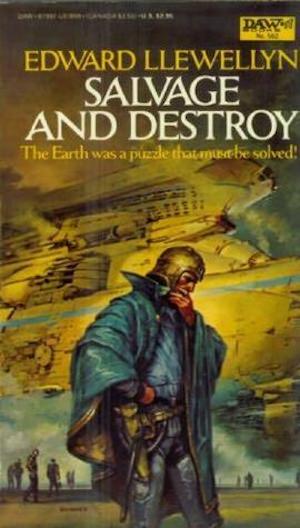
The Cluster stumbled over Earth centuries ago, found little of interest, and left, taking only a handful of human refugees. It left an orbiting monitor to keep an eye on the barbaric world. To the considerable alarm of the Ult who rule the Cluster, human technology has progressed faster than anyone in the stagnant Cluster could have predicted. Odds are that humans will destroy themselves in the near future. If they do not, and if they get their hands on that monitor, they could reverse-engineer FTL travel and do to the Ult what the Ult did to the now-extinct Drin, back when the Ult were virile barbarians themselves.
Lucian of the Ult commands a starship crewed by the descendants of the human refugees. They are dispatched to dispose of the monitor. We then learn that the handful of humans carried back to the Cluster now number millions, each of whom is immune to the psionic powers on which Ult rule rests. Moreover, it seems the shape-shifting Drin (whom the Ult believed long vanished) have reached Earth and have been hiding there ever since. Furthermore, a cabal in the Cluster took steps to sabotage the mission, inadvertently preventing Lucian from sharing anything he has learned with the Cluster. Nothing for it, therefore, but for Lucian to throw his lot in with the humans.
Unfortunately, Llewellyn died soon after this novel was published, so if he planned to return to the Cluster to show whether the ruling Ult ever comprehended that their supposed subjects had de facto replaced them as the governing class on many outlying planets, he never had the chance to do so.
Usurpation by Sue Burke (2024)
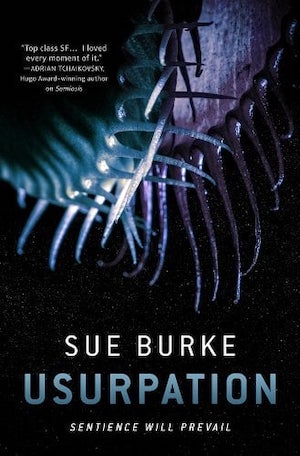
Humans were helpless to resist invasion by the extraterrestrial Rainbow Bamboo. In part this was because humans didn’t comprehend that they were being invaded by a seemingly harmless exotic plant. Mostly it was because humans were preoccupied with many far more apparent pressing challenges. By the late 3rd millennium, humans number a bare quarter billion and the decline shows little sign of stopping. Left to themselves, humans will not save themselves.
Levanter and Levanter’s Rainbow Bamboo kin are determined to provide humans with the guidance that humans so sorely require. This will be a challenge, as Rainbow Bamboo lack hands as well as mobility. They are, after all, the plants suggested by their name. Nevertheless, the alien plants don’t lack for cunning. Success is assured… unless humans import another invasive species that is destructive to humans and Rainbow Bamboo alike. Which of course the humans do.
It’s a good thing for humans that the Rainbow Bamboo choose to look out for other species, because the humans in this novel don’t appear to have any benefits to the Bamboo other than providing nutritious mulch.
Five stories barely scratch the surface of alien conquerors discovering too late why conquering Earth may be a bad idea. Feel free to regale us with works unnamed above. (Bearing in mind that I might have omitted them because they were mentioned in earlier essays.)










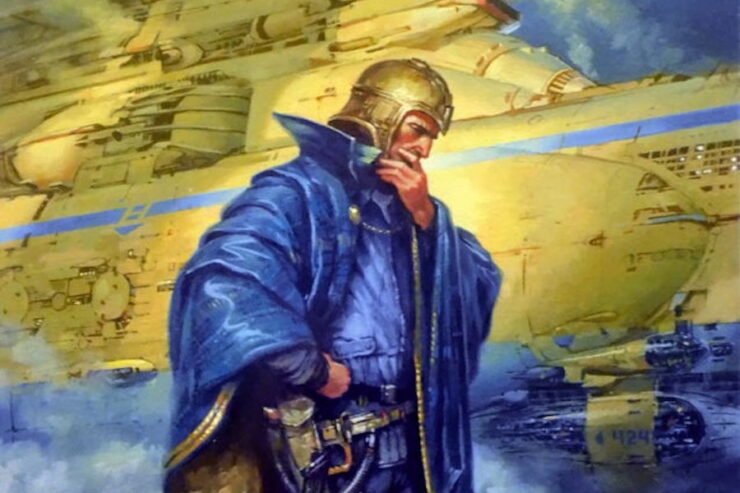
Clarke’s Childhood’s End comes to mind, but iirc you covered that one not long ago…
Or the novella it was based on, “Guardian Angel.” Although that was actually a successful attempt at ruling humans.
The Overlords in Childhood’s End weren’t ruling humans, they were shepherding our natural evolution to the next stage. They were more midwives than conquerors.
And yet they established clear governance in the interval – I’d argue they were indeed ruling…
In James Cambias’ Arkad’s World aliens have conquered Earth and are reshaping humanity to worship them, but we only hear about it, as the book is set on a different planet where a few humans are trying to find something to help fight the aliens.
Ooo! Ooo! I know! Battlefield Ear— ooooof!
I have to admit, Battlefield Earth is a bit of a guilty pleasure of mine. Dunno why, and yes I know how problematic it and its author are: but still. I kind of like this one.
I bounced hard off BE, twice. I tried reading it as an important bit of SF history. Both times I gave up and wished the author was still alive so I could give him a long and harsh critique of his abject failure.
Way of the Pilgrim, Gordon R. Dickson.
I first read the short story “Enter a Pilgrim” before high school … I think in Lester Del Rey’s Fourth Annual Best SF of the Year collection. I think it was later expanded into this novel about the same premise, which I have not yet read.
I read “Enter the Pilgrim” in a random copy of Astounding I had – I think. Later I bought the novel and read it’s whopping 500+ pages (large for that time) and pretty much all I can remember about it was the feeling of “finally finished THAT!”. In other words a hard slog with not much to get for it.
“Enter a Pilgrim” was in the first issue of Analog I ever bought — August 1974. I read it and the sequel novella but never continued — I could already sense it was going to be a slog.
I had the del Rey in paperback, and the Dickson was featured on the cover.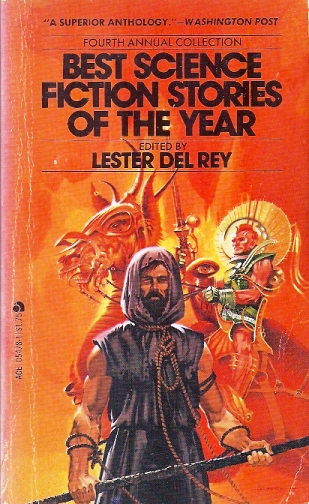
So, drag and drop is an option for images. Good to know.
I remember looking forward to the Dickson novel but I don’t think I ever picked it up.
(There’s an essay: sequels I pestered poor book store clerks about over and over in the 1970s)
Dickson’s None But Man didn’t have humans under alien rule, just encountering the alien Moldaug as they expanded through space, and fighting a bit over territory. Still comes to mind.
If I recall correctly, Pandora’s Planet wasn’t the unalloyed “Humans over all” story that Campbell would have preferred (rot13: Gur Vagrteny Havba, orvat infgyl zber cbchybhf guna Rnegu, unq cyragl bs pvgvmraf whfg nf fzneg nf nal uhzna, naq fbzr bs gurve nccnerag ybffrf jrer cneg bs gurve (hygvzngryl fhpprffshy) cybg – naq gurer’f n gnt raqvat fhttrfgvat gung arjyl pbagnpgrq nyvraf ner gb uhznaf jung uhznaf ner gb gur Vagrteny Havba.)
Which is of course a danger one has to consider in settings where the Milky Way has millions of advanced civilizations. Poke around long enough and you will encounter something you will wish you had not.
That’s my explanation as to why long range exploration ended in Known Space around the time FTL made it super-easy. In the years running up to that, humans had run into Bandersnatch, Slavers, Protectors, and Kzin. The Outsiders who sold us FTL were OK and the Puppeteers were not overtly awful but who can be sure there’s not something as hostile as Protectors and advanced as Outsiders waiting for some idiot explorer to draw their attention to humanity? So perhaps the UN decided to stop exploring.
Still, My embarrassing knowledge of Known Space will now be on display.
Interest in exploration for exploration’s sake seems to have ended before FTL was bought. Perhaps the encounter with a Slaver have an indication of the dangers “out there”. The STL colonies within 40 LY might have actually been set up as “tripwires”: communications from one of them stopped, Earth (where 99% of humanity was) night have some advance notice if an invasion.
The Kzinti would have blown that scheme apart of course, and after FTL drives were purchased, new colonies would be pointless.
Still, with FTL drives, ten-year exploration missions would be simple- 3 years out, (360 LY), 4 years exploring, 3 years back. The Pleiades would be an obvious target- but I’m not sure what else would be within 400 light years or so .
With all this, it makes sense that the Ringworld would have already been discovered. The ARM and other groups probably knew of it and were keeping the inf
In Ringworld, Louis tells Speaker that if Speaker steals the special hyperdrive, the Kzin will expand without caution and run into “Bandersnatchi with hands, grogs with feet, kdatlyno with guns.” Louis may not have made up this argument on the spot, but rather could be repeating human “common knowledge” of why they’re expanding a lot more slowly these days
Also the surface of the sphere defining the edge of human exploration would grow as the cube (IIRC) of the diameter of the sphere.
Volume grows as the cube, area as the square.
Still, I take the point — the rate of outward expansion would presumably slow down because there’d be exponentially more worlds to explore or settle the farther out you get.
This makes me think of Julian May’s Galactic Milieu books – where earth is slowly shepherded into a galactic parliament
Another 1950’s – Conquest of Earth, by Manly Banister
John Varley’s original Eight Worlds setting doesn’t exactly count, since while aliens have taken over Earth, they also evicted almost all the humans and IIRC are not attempting to govern the few remaining ones. (I don’t know if the same holds true for his reboot of the setting.)
The Invaders still don’t care about humans as long as they aren’t a threat to whales.
My favorite alien conqueror novel of all time is Sleeping Planet by William Burkett, another tale that appeared in Analog. Weirdest was Invaders From Rigel by Fletcher Pratt where the aliens turned humans into statues, except for a few turned into metal automatons, and those from the Southern Hemisphere, turned blue by changes in body chemistry.
Perhaps the Hurrians have their own special vice to match the human love of violence: impatience.
I mean, they have “Hurry” right in the name…
I enjoyed the K.D. Wentworth / Eric Flint series Course of Empire/ Crucible of Empire
John Christopher’s Tripods trilogy had Earth dominated by extraterrestrial Masters that fitted everyone with a Cap that prevented rebellious thoughts. And went about in tripods, of course. The Masters were chlorine-breathers and couldn’t keep a close-enough eye on underground unCapped humans who were able to foil their plan to replace the Earth’s atmosphere with a chlorine-based mixture.
The trilogy is a personal childhood favourite of mine. As was only natural when limited to what was on the shelves when I visited the local Library, I started reading the trilogy with Volume 2, “The City of Gold and Lead”. Christopher later wrote a prequel (a single volume – these days it would be at least an additional trilogy) covering the actual invasion and conquest of Earth.
It’s a pity the 1980s British TV adaptation of the trilogy, “The Tripods”, was never completed.
I enjoyed Turtledove’s unexpected 3rd power arriving from space during WWII to complicate matters, and finding that humans had progressed since last they looked. And also, to paraphrase Pratchett – Axis and Allies immediately joining forces to (try to) beat up Green. In The Balance is the first one.
Fleetlord Atvar: “We will just order them to stop.” This is one line guaranteed to get the entire theater to howl in laughter for a full five
minutes once a movie gets made of the Lizardwar books.
“Footfall” by Niven and Pournelle.
There’s a novel that aged poorly.
Aged poorly? It was rotten from the getgo!
Starhammer by Christopher Rowley. His books should be better known by SF fans.
It’s not about aliens conquering Earth, but another angle on “aliens attempting to govern humans” can be found in my duology Arachne’s Crime and Arachne’s Exile (and the upcoming third book Arachne’s Legacy), in which the crew of a human starship is found guilty of accidentally destroying an alien space habitat and the aliens attempt to assimilate the humans into their own society while they repay their debt. Naturally, a lot of the humans are not particularly sanguine about being absorbed into an alien culture.
Kate Elliott’s Jaran series comes to mind.
“Divide and Rule” (1939) by L. Sprague De Camp.
Out of the Dark by David Weber is a comparatively recent (2010) iteration of this premise, although the even more recent sequels co-written by Chris Kennedy flip the script – having successfully kicked the invaders off-planet in the first book, our Terran heroes then set out to conquer the immediate galaxy (nominally in self-defense, of course, because the aliens governing the immediate galaxy may still have superior tech in their back pockets).
It’s also a book that sharply polarized its readership, because one of the initially secondary elements involves the introduction of a character borrowed straight up – evidently with permission and/or blessing – from the late Fred Saberhagen. (The sequels flip the script on that one, too, in a different way that I am minded not to spoil, but which is at least as bizarre and potentially polarizing as the initial borrowing.)
Mind you, I liked the first book, possibly because I’d been spoiled for the Saberhagen twist ahead of time. The sequels I’m less fond of, though I think they’re still readable, and I am of extremely mixed minds about what they do with That Character. It’s extremely clever, but it’s also an awfully drastic twist….
Earth is conquered and ruled for a period by the Qax, I believe it was, in Stephen Baxter’s Xeelee sequence. Humanity’s reaction, after the liberation of Earth, is to expand, extirpating every other intelligent species they come across, regardless of whether they’re possibly hostile or not.
in the Xeelee sequence, humans were actually conquered _twice_ by alien species; first by the Squeem, and later by the Qax.
While this must doubtless have been terribly embarrassing, it really didn’t justify our species spending the rest of its existence attempting to carry out genocide on a cosmic scale.
One of the things I liked about reading the Xeelee stories was gradually realising “Oh, right, now I get it – _we’re_ the bad guys!”
Twice? Thank you. With Baxter, it’s easy to lose track.
He doesn’t seem to have a high opinion of his own species, in aggregate. It’s not evident in just the Xeelee sequence.
Makes me think of “….And call me Conrad.” by Zelazny. The Earth is owned by the blue aliens who treat it like an amusement park. Conrad, human(ish) ends up owning it.
Timothy Zahn’s earlier books include *Blackcollar* and a couple sequels, where the aliens rule by “loyalty conditioning” humans who act as their proxies and lower government levels. The titular Blackcollars are techno-ninjas who are out of the drug that makes them special. I have forgotten how it all ends, except that at some point they instead get a drug that breaks loyalty conditioning.
I really liked the “The Course of Empire” series by Eric Flint and K.D. Wentworth.
it doesn’t follow the standard trope of Aliens invade but Humans are to much for them to handle. It starts 20 years after the invasion and humanity has lost and been colonized. The Alien Jao rule Earth but it has not fulfilled their expectations of a resource world and the scion of one of the Jao’s most prestigious clans has been sent in to fix the mess.
Its unique in the fact that the human collaborators are the protagonists and the human resistance against the Jao is misguided at best and outright villainous at worst.
The Jao themselves are truly Alien, and while they learn to appreciate some things about human culture they are not humans in funny suits and the humans learn to appreciate things about Jao culture.
In the end is about the humans and aliens coming together to form something new rather then just rebuilding the old human or Jao pasts.
Books 1 and 2 in the series are good (With book 2 introducing the Alien Lleix to understand). Unfortunately K.D. Wentworth died and book 3 lacked the Alienness of the Jao and the Lleix and the series was ended.
“The Alien Rulers”, by Piers Anthony (1968, long before he took a weird turn) has aliens overlording Earth, and doing a good job of it. Which still annoys the humans who would rather be incompetently ruled by their own kind. The plot twist was memorable enough (I read this story in the late ’70s) but doesn’t stand up to close examination (really? everyone agreed to this?). It still made the cover of Analog with a Freas illustration.
https://www.isfdb.org/cgi-bin/pl.cgi?56804
Jeez, that cover. Smoking in public. And a cover price of 60 cents.
”The Mercy of Gods” by James S.A. Corey (authors of the Expanse series) is a very recent example of an aggressive alien species but they hardly confine themselves to humans. They have already conquered and assimilated thousands of other species into their empire before they encounter humans. And although this is only Book 1, the opening retrospective rumination by one of the empire’s librarians makes it clear that attempting to govern (rather than outright slaughter) humans will be a regrettable mistake as the series continues.
In Salvage & Destroy
I imagine he was planning to show the Ult who rule the Cluster were really Drin. He planted hints throughout the novel.
Very surprised not to see MANKIND UNDER THE LEASH/PUPPIES OF TERRA by Thomas M. Disch here. Yes, things seem to be going oh not so well, but yet the humans persist.